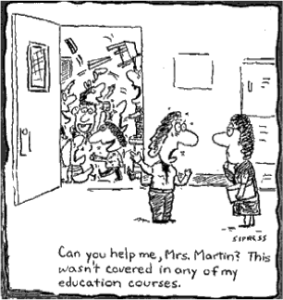In the last post I asked the question “Is it the teacher who has the large heart that makes the distance in teaching or are they ultimately the ones who become heart-broken and leave the profession?”
I think the answer is both.
In my observation, it is the teacher who has a positive outlook, who is passionate and interested in what they are doing, who genuinely cares for the well being of the student that is able to continue on during a tough semester or year. However it also the teacher who is enthusiastic and passionate who is most prone to becoming disillusioned with either the teaching system or the reality of the teaching workload and leaves for another job that may or may not be as rewarding but is a whole lot less stressful!
On the flip side, even worse than teachers leaving the profession in large numbers are teachers who continue to teach having lost their heart for teaching. There are far too many teachers who are hard hearted, for the most part are miserable to be around. I read the following comment today made by a teacher on the teachers.net blog
“For those high school students who just don’t want to do work, do nothing for them. Unmotivated students get zeros, maybe that can help them improve in the future. Give ultimatums for students that don’t want to work [reduce grades for late work, etc.]. Give frequent quizzes to make sure students know they must stay on track. Always check in, because if you lose sight of their work, you lose THEM. Calling parents can also help when students are unmotivated. I have found that getting the parents involved can really light a fire.”
It’s a bad day when you get to this place in your teaching!
So what can we do to guard out heart so that we don’t end up like this person?
1. Regain perspective!
Tomorrow is a new day. The worst thing about a teacher who has had a bad day is that the students go home and don’t give your lesson another thought, yet we go home all tense and lose sleep over it. We need to learn that the past is the past and leave it there! There is no point carrying yesterday’s burdens into today – today will have enough of its own troubles without us needing to compound the problem.
That is easier said than done. So how do we do this?
2. Reflect
When you have had a bad day it is helpful to spend some time reflecting on what was the tipping point in the day went it all went wrong. By that I mean, what was the point where you lost control, or that you became aware that you had a battle on your hands. It helps to think through what were the events leading up to the tipping point.
It is a fact that 95-99% of life is made up of habits or routines. Success psychologists say that 99% of all results (both good and bad) are built upon routines. If this is true then there is a 99% chance that something in your routine is causing your classroom management problems. Now I understand that we can all have one off bad days, but if you are constantly seeing the same results you need to change your routine!
There is a 99% chance that something in your routine is causing your classroom management problems
3. Refocus
What are you going to try or re-enforce? Once you have looked at your routines what are you going to try and implement? What are you going to change? Maybe it is the way the students enter the room. Maybe it is the way you state you expectations up front.
The truth is there are almost an unlimited amount of things you can try, and the only way to find out what works for you is trial and error. Now don’t go changing everything at once (that is a recipe for disaster!), but rather use your reflection time to narrow down on what is the number one thing you should change and start there.
We will look at the final 2 ‘R’s’ tomorrow but for now, what do you do to bounce back from a bad day?

















